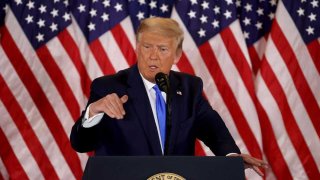President Trump Holds the Cards to Reshape the World
A second Trump term could redefine global alliances, overpower adversaries, and hoist America’s leadership in a new era of great power competition.
President Donald Trump is a fortunate man with the resolve to create his own luck. As he reenters the Oval Office, he finds a world in flux, with American adversaries more weakened than during his first term. He faces a defanged Iran, a beleaguered Russia hemorrhaging resources in an unwinnable war, and a China grappling with economic challenges and domestic discontent. With his signature traits—tactical bravado, unpredictability, and a penchant for dealmaking—Trump holds a royal flush of opportunities to reshape global dynamics, potentially leaving a legacy comparable to Presidents Harry Truman, Dwight Eisenhower, and Ronald Reagan.
Truman enabled the birth of Israel and laid the groundwork for the modern Middle East. Trump has the chance to reconfigure the region, shifting from decades of Arab-Israeli conflict to an era of collective security and prosperity. Even before taking the oath, he facilitated a ceasefire and a hostage release. Once in office, he can achieve far more. Syrian president Bashar al-Assad is deposed, and Hamas and Hezbollah are crippled, reflecting Iran’s deteriorated state after Israeli precision airstrikes dismantled its air defenses.
Meanwhile, Israel, motivated after the horrors of October 7, stands stronger than ever. Trump is well-positioned to expand the historic Abraham Accords, normalize relations between Israel and Saudi Arabia, and guide the region spanning the Arabian to the Mediterranean Seas from conflict to collective security. This could usher in the age of a “New Golden Road”—a thriving India-Middle East-Europe Economic Corridor (IMEC).
Truman rebuilt Western Europe with the Marshall Plan; Eisenhower ensured its security and strength; Reagan broke the Soviet Union and brought down the Berlin Wall. Trump can similarly propel Eastern Europe’s economy and security to unprecedented levels, enable a secure Ukraine and the Black Sea, and put the Russian bear back in a cage. A “Trump Plan,” driven by American private sector investment—not taxpayers—could transform the Adriatic-Baltic-Black Sea region into the economic and security engine of a self-reliant Europe. This vision connects Eastern Europe through the New Golden Road to the Indo-Pacific, offering a pathway to a safer, stronger, and richer America.
Looking further north, the new president stands poised to shape the Arctic in unprecedented ways. The Arctic, increasingly accessible and resource-rich, has become a theater of activity for adversaries like China and Russia. By strengthening ties with Greenland—an autonomous Danish region—Trump could bolster American defense and economic interests in this new frontier of great power competition. Collaborating with Copenhagen, Trump envisions greater U.S. responsibility for Greenland’s security and development. With Alaska and Greenland as twin pillars, a “Free North” initiative could emerge, enhancing cooperation with NATO’s northernmost members and fostering responsible Arctic development. This initiative would solidify collective defense capabilities, stretching from Alaska to Finland and the Baltics while engaging nations like Canada, the UK, and Iceland.
Through these renewed regional reconfigurations, Trump could establish overlapping economic and security partnerships spanning the globe—from Alaska to Asia and across the Atlantic. By linking free and open spaces, his initiatives could eclipse China’s Belt and Road Initiative, relegating it to a historical footnote. Unlike Beijing’s top-down projects, Trump’s approach should prioritize sustainable, economically sound partnerships, strengthening both American and allied prosperity and security.
To the east, Trump’s first term elevated the Indo-Pacific to global prominence, invigorating coordination among the Quad (the United States, Japan, India, and Australia). A second term could deepen this progress. Just as he spurred NATO allies to share more of the defense burden, he could demand similar commitments from Indo-Pacific partners, where the United States largely provides unilateral security guarantees. Establishing an Indo-Pacific Treaty Organization (IPTO) by uniting existing bilateral agreements could mirror NATO’s success, creating a robust and resilient security framework. Founding members like Japan, the Philippines, the UK, and Australia may eagerly join.
Trump’s first National Defense Strategy made clear we have entered a new era of great power competition. But an era of great competition also calls for great partnerships. During his second term, India, now the world’s most populous nation and soon its third-largest economy, will play a pivotal role. With political instability in Tokyo heightened by the loss of Prime Minister Shinzo Abe, it is up to India and the United States to co-anchor the Free and Open Indo-Pacific. The Trump-Modi friendship, underpinned by converging national interests, could elevate this bilateral relationship to a Great Power Partnership.
A global economic quad comprising the United States, EU, India, and Japan could counter Chinese mercantilism, ensuring the global digital economy advances shared interests and values. Trump could also strengthen U.S. institutional capacity for economic statecraft, redirecting Cold War-era agencies to address emerging nations’ economic aspirations while advancing American interests. Crucially, he could engage Africa and Latin America as economic and security partners, prioritizing industrialization—particularly critical mineral processing—to meet American and allied needs. An updated Monroe Doctrine could limit foreign interference in the Western Hemisphere, safeguarding regional security and prosperity.
The confluence of global events and Trump’s unique brand of leadership presents unparalleled opportunities to elevate the U.S.’s influence in shaping a more secure and prosperous world safeguarding American interests and values. Whether his legacy will parallel Truman’s or Reagan’s will depend on Trump’s ability to balance engagement and retrenchment. Yet, with his knack for seizing opportunities, Trump could cement his place as one of the twenty-first century’s most transformative leaders, advancing American interests and prosperity to heights unseen in living memory.
Kaush Arha is a nonresident senior fellow at the Atlantic Council and previously served as the senior advisor for global strategic engagement at USAID and the G7 Sherpa for the Blue Dot Network during the Trump administration.
Image: Chip Somodevilla / Shutterstock.com.

